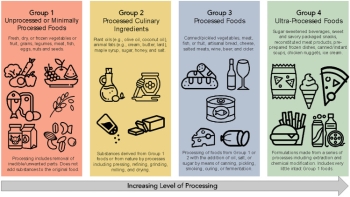Monteiro et al 2012 - Global health and Food processing: a new classification

Food processing is now the main shaping force of the global food system, and the main determinant of the nature of diets and related states of health and well-being.
Download File: Download pdf here (1.4 MB)
FAB RESEARCH COMMENT:
This open-access paper in World Nutrition - the Journal of the World Public Health Nutrition Association - describes the rationale for, and methodology of, a new system for the classification of foods.This takes into account the many different types and levels of 'food processing', and emphasises that it is the increasing consumption of 'ultra-processed foods' that best explains the dramatic increases in diet-related disorders of physical and mental health worldwide.
As the authors explain (emphasis added):
"..the principal dietary driver of pandemic overweight and obesity, and of related chronic non- communicable diseases, is what we identify as ultra-processed products. While edible and usually very palatable, these are not real foods. They are fundamentally different from foods that have been processed, however intensively, in ways that modify or even transform the original unprocessed food.
Ultra-processed products are not made from foods. They are made from ingredients. Some of these are derived from foods, such as oils, fats, flours, starches, and sugar, but many are obtained by the further processing of food constituents, such as hydrogenated oils, hydrolysed proteins, starch-modified sugars, and extruded or otherwise processed remnants of meat.
Numerically, the great majority of the ingredients of ultra-processed products are additives of a variety of types, which include among others, preservatives; stabilisers, emulsifiers, solvents, binders, bulkers; sweeteners, sensory enhancers, flavours, and colours.
The function of many of these is to make the product look, smell, feel and taste like food. Bulk may come from air or water. Synthetic micronutrients may be added to ‘fortify’ the products.
These products taken together began to dominate the food supplies of high-income countries in the global North such as the US, Canada, and the UK in the second half of the last century. The rates of their production and consumption accelerated as from the 1980s, as did rates of obesity including among children. This pattern more recently has been and is being repeated in countries of the global South."
Food processing is now the main shaping force of the global food system, and the main determinant of the nature of diets and related states of health and well-being.
To reveal this, we have here created a new classification of foods. This gives primary importance to the nature, extent and purpose of food processing.
Our general theory is that the global food system, and specifically its increasing domination by processed food products as specified and defined here, is the big issue for nutrition, disease, health and well-being.
We begin here by explaining the history and development of the theory and its context, and our findings and thinking so far. We also outline implications for assessment of dietary patterns, development of dietary guidelines, promotion of good health and well-being, and prevention and control of obesity and related chronic non-communicable diseases.
It is evident, we believe, that the current conceptual framework of nutrition, which places it solely or mainly within the biological sciences, does not adequately respond to the circumstances of our time. Undernutrition, food insecurity and hunger persist in many parts of the world, even within high-income countries, at unacceptable and even scandalous levels. But what is now the pandemic of overweight and obesity, and of other related chronic non-communicable diseases such as diabetes, is out of control.
We believe that this global public health crisis will remain uncontrolled until a new and more relevant and appropriate conceptual framework is developed, accepted, and applied. Our purpose here is to develop this new way of thinking, which from our experience and in our judgement so far, is the best fit with the facts.
See the rest of the in-depth analysis here, or download the attached pdf.
